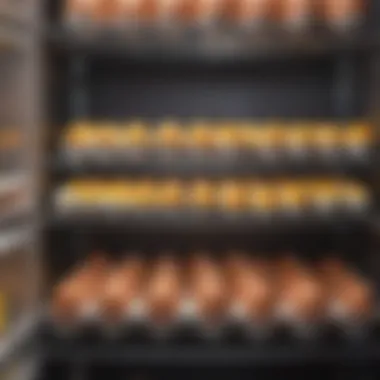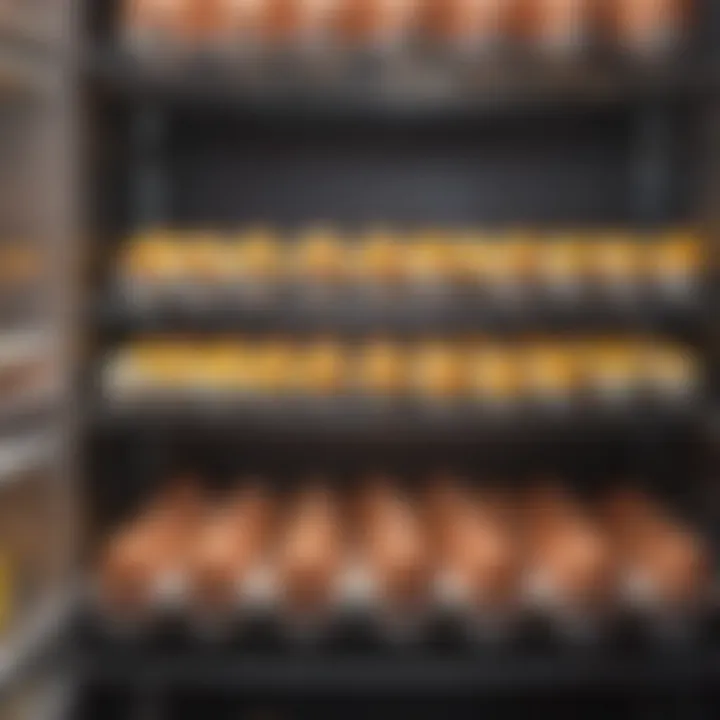Boiled Egg Storage: Guidelines and Insights


Intro
Boiled eggs are a staple in many diets around the world. They offer protein, versatility, and convenience. However, their storage is often overlooked. Improper storage can lead to spoilage, impacting both taste and safety. To avoid food waste and ensure freshness, understanding the best practices for storing boiled eggs is essential. This article provides a thorough guide to boiled egg storage, discussing techniques for both unpeeled and peeled eggs, addressing spoilage issues, and offering insights into optimal refrigeration practices.
Recipe Overview
Although boiled eggs don't require an intricate recipe, they can serve as a base for various dishes. A simple boiled egg can be enjoyed plain, incorporated into salads, or utilized in dishes like deviled eggs or egg salad.
Brief Description of the Dish
Boiled eggs are prepared by immersing them in boiling water until the desired doneness is achieved. The cooking time influences the yolk's creaminess—soft, medium, or hard. Understanding how to maintain these eggs post-cooking is crucial to keep them safe and flavorful.
Storage Techniques for Boiled Eggs
Proper storage techniques help extend the shelf life of boiled eggs. Here are some methods to consider:
- Unpeeled Eggs: Store them in the refrigerator in their shells. The shells provide a natural barrier to moisture and bacteria.
- Peeled Eggs: Keep peeled eggs in a container filled with water. Change the water daily. Alternatively, wrap them in a damp paper towel and place them in an airtight container.
Best Containers for Storage
Choosing the right container vastly impacts storage effectiveness:
- For Whole Eggs: Use a covered bowl or a plastic egg tray. This prevents odors from affecting the eggs.
- For Peeled Eggs: Airtight containers are ideal. Adding a paper towel helps absorb excess moisture, which could lead to spoilage.
Duration Guidelines
Understanding the duration for which boiled eggs can be stored is vital. Generally, boiled eggs can remain safe in the refrigerator for about one week. Ensure to mark the storage date for precise tracking.
Signs of Spoilage
Be vigilant for signs that boiled eggs may have gone bad:
- Unpleasant odor: A strong sulfur smell often indicates spoilage.
- Discoloration: Shells may darken over time. Peeled eggs may develop a slimy texture or discoloration.
- Expiration: Always practice caution if the eggs exceed the one-week shelf life.
Ending
In summary, understanding how to store boiled eggs is paramount for both safety and quality. By following these guidelines, you can ensure that your boiled eggs maintain their freshness and are ready for consumption throughout the week. Proper storage techniques not only enhance culinary enjoyment but also promote efficiency in meal preparation. Being informed about the best practices for boiled egg storage makes it easier to integrate this nutritious food into a balanced diet.
Understanding Boiled Egg Storage
Storage is crucial for maintaining the quality and safety of boiled eggs. Knowing how to properly store these eggs ensures they remain fresh and tasty for consumption. This section aims to dig into the significance of boiled egg storage. Proper storage not only prevents spoilage but also helps to preserve nutrients, flavor, and texture.
The Importance of Proper Storage
Boiled eggs, when stored correctly, can provide a convenient protein source for several days. If stored improperly, however, they can become a health risk. Salmonella is a concern when eggs are not handled carefully. Awareness of proper methods will allow consumers to enjoy the benefits of boiled eggs without the worry of foodborne illness. Additionally, proper storage can extend the eggs' lifespan, making them a more valuable item in your culinary toolkit.
Factors Affecting Egg Freshness
The freshness of boiled eggs depends on several factors. These encompass temperature, humidity, and packaging. Recognizing how each factor influences boiled eggs can lead to smarter storage practices.
Temperature
Temperature plays an essential role in preserving the quality of boiled eggs. Keeping boiled eggs at a consistently cool temperature slows down bacterial growth. The ideal storage temperature is below 40°F (4°C). This range is widely regarded as safe. Beyond this, eggs can spoil quickly, leading to health concerns. A major consideration is that the colder the environment, the longer the eggs can retain their freshness.
Humidity
Humidity may seem like a minor factor, but it significantly affects boiled egg freshness. When the humidity is too high, it can promote mold growth and spoilage. Conversely, low humidity can lead to dehydration of the egg. Keeping boiled eggs in a well-ventilated space without excessive moisture helps maintain their quality. A balanced humidity level is crucial to preventing spoilage.
Packaging
The way boiled eggs are packaged can also influence their freshness. Eggs should ideally be stored in a hard container that shields them from physical damage and helps regulate airflow. Sealing them in an airtight container can help preserve moisture without letting in contaminants. However, care must be taken to ensure the container is not completely airtight, as some airflow is needed to reduce the possibility of bacteria build-up. Quality packaging will ultimately enhance the boiled eggs' shelf life.
Storage Techniques for Unpeeled Boiled Eggs


Storing unpeeled boiled eggs properly is essential to maintain their freshness and nutritional quality. When these eggs are prepared, they will have a protective barrier with their shells. Knowing how to manage this storage can impact not just flavor but also safety. Unpeeled boiled eggs are often used for meal prepping, snacks, and various recipes, making effective storage choices significant for food lovers and cooks alike.
Refrigeration Guidelines
Optimal Temperature
The optimal temperature for storing unpeeled boiled eggs is between 0°C and 4°C (32°F and 39°F). Keeping eggs at this temperature ensures they remain fresh and retain their texture. Cold storage slows down bacterial growth and metabolic rates in eggs, preventing spoilage. It is the most reliable method for ensuring long-term freshness.
One key characteristic of the optimal temperature is its universality. It is a common household standard in many refrigerators. This accessibility makes it a beneficial choice for virtually anyone, from novice cooks to culinary enthusiasts.
A unique feature of this temperature range is its balance. It is cold enough to inhibit spoilage yet warm enough to avoid freezing the eggs. Freezing may cause the egg white to become watery when thawed, affecting the final dish's quality. Therefore, careful temperature control plays a vital role in storing unpeeled boiled eggs.
Duration of Storage
The duration of storage for unpeeled boiled eggs can range from one week to ten days, depending on various factors such as temperature and handling. The ability to store eggs for this period allows flexibility in meal preparation and reduces food waste.
Its key characteristic is the practical time frame it offers. Knowing this duration helps consumers plan meals effectively. It eliminates guesswork and thus enhances overall meal organization.
However, the key to successful storage lies in vigilance. Boiled eggs should be inspected regularly. If any sign of spoilage appears, such as an off smell or changes in texture, it is essential to discard them. The clarity around duration helps maximize both quality and safety when enjoying these delicacies.
Storage Containers
Types of Containers
Using the right type of container to store unpeeled boiled eggs is another crucial element. Recommended choices include plastic egg cartons and glass containers. These options protect the eggs from breaking while preventing moisture loss.
The best characteristic of these containers is their designs which are often tailored specifically for eggs. This makes them a popular choice. They prevent unnecessary space usage in the refrigerator while ensuring eggs stay intact.
A significant feature of plastic cartons is their lightweight nature, making them easy to handle. On the other hand, glass containers have the advantage of visibility, allowing you to quickly check if the eggs are still fresh. Balancing these features will assist in making the right choice based on individual preferences.
Sealing and Ventilation
Sealing and ventilation are vital concepts when storing unpeeled boiled eggs. For optimal conditions, airtight containers are often recommended. These containers limit exposure to external odors and moisture, which can compromise egg quality.
A key characteristic of sealing is its role in maintaining flavor integrity. This preservation ensures that the eggs do not absorb unwanted smells from the refrigerator. It is a beneficial method for individuals who have strong cooking spices or other pungent foods stored nearby.
The unique feature of ventilation lies in allowing some airflow, which can help maintain humidity levels inside the container. However, it is essential to strike a balance. Too much airflow may result in drying out the eggs, while too little could cause spoilage. Generally, a well-sealed but not overly tight fitting cover offers the best of both worlds.
In summary, understanding these storage techniques for unpeeled boiled eggs not only improves quality but also enhances food safety for a variety of culinary purposes.
Storing Peeled Boiled Eggs
Storing peeled boiled eggs requires particular attention. Unlike unpeeled eggs, peeled ones are more vulnerable to spoilage. This susceptibility is due to the removal of the shell, which normally serves as a protective barrier. When handling peeled eggs, one must consider factors such as time, temperature, and method of storage to maintain freshness and ensure food safety. Understanding these elements can help both home cooks and culinary enthusiasts maximize their enjoyment of boiled eggs.
Immediate Consumption vs. Extended Storage
Peeled boiled eggs can be eaten immediately or stored for later use. The decision depends on individual needs and preferences. Consuming them right after boiling provides the best taste and texture. However, for meal prep or busy schedules, extended storage can be advantageous. If you choose to store, the focus should be on maintaining quality. The ideal length of time for refrigeration is typically one week, provided the eggs are adequately stored.
Best Practices for Peeled Eggs
When it comes to best practices for storing peeled boiled eggs, there are two main techniques: the use of water and proper covering techniques. Each has unique benefits and drawbacks, impacting the overall storage experience.
Use of Water
Storing peeled boiled eggs in water is a practical method offering multiple benefits. By immersing the eggs in water, you can create a moisture-rich environment. This helps preserve the eggs' texture and prevent them from drying out. The key characteristic here is that water aids in maintaining the freshness.
However, while using water is effective, it is essential to regularly change it to prevent bacterial growth. Not changing the water could be a risk factor for spoilage. Additionally, some individuals might find the approach less convenient than other methods.
Covering Techniques
Covering peeled boiled eggs properly is another important aspect of effective storage. Utilizing airtight containers ensures that the eggs are not exposed to air, which can lead to undesired drying and potential absorption of other odors in the refrigerator. The key characteristic of this method is its simplicity and effectiveness.
A unique feature of using a cover is the ability to stack eggs in containers without damage. However, if containers are not compatible, overcrowding could occur, resulting in broken eggs. Therefore, choosing the right container is crucial. Adequate covering remains one of the best strategies to prolong the life of peeled boiled eggs.


Shelf Life of Boiled Eggs
Understanding the shelf life of boiled eggs is essential to maintaining food safety and quality. Knowing how long boiled eggs can last helps in meal planning and reduces food waste. The shelf life can depend on various factors, including whether the eggs are peeled or unpeeled, how they are stored, and the conditions they are exposed to after cooking. This section will delve into how to effectively identify spoilage and the significance of understanding expiration dates.
Identifying Spoilage
Spoilage detection is critical for ensuring the safety of boiled eggs. Knowing how to identify if an egg has gone bad prevents potential health risks associated with consumption. Two primary methods for identifying spoilage are visual cues and smell tests, which can easily guide proper egg quality assessment.
Visual Cues
Visual inspection is often the first step in assessing a boiled egg’s freshness. Common visual cues include checking for any unusual discoloration or signs of mold on the eggshell. Fresh boiled eggs typically have a clean and intact shell, whereas any cracks or slimy texture can indicate that spoilage has begun.
The key characteristic to note is the exterior and any visible changes. This method is beneficial because it requires no special tools or equipment. A unique feature of visual assessment is its simplicity; anyone can perform it with just their eyes. However, one disadvantage is that not all spoilage can be detected visually. Therefore, this method should be combined with other assessments.
Smell Tests
Alongside visual cues, smell tests serve as another straightforward way to evaluate boiled eggs. A fresh boiled egg should have a neutral or slightly pleasant smell. If there’s a strong sulfurous or rotten odor, it is a clear indication that the egg is no longer safe to eat.
The significant aspect of smell tests lies in their directness. This method highlights a key characteristic: the sense of smell can detect spoilage that visual cues may miss. One unique feature of using smell tests is that they offer immediate feedback on egg quality. A disadvantage, however, is the reliance on personal sensitivity to odors, which can vary widely among individuals.
Best Before vs. Use By Dates
Understanding the difference between best before and use by dates is vital for food safety. The best before date indicates the period during which the product is expected to remain at its best quality. It does not mean that the food is unsafe after this date but rather that its quality may start to decline. In contrast, the use by date is about food safety; consuming food beyond this date can pose health risks.
Typically, boiled eggs will have a longer best before date if they are stored correctly. Taking note of these dates and managing egg consumption accordingly helps maximize both safety and enjoyment of the cooked product.
In summary, recognizing spoilage indicators and comprehending expiration dates contribute significantly to the overall understanding of boiled egg storage, ensuring fresh and safe consumption.
Temperature Control and Security
Maintaining appropriate temperature control is crucial when it comes to storing boiled eggs. Eggs are a protein-rich food that can provide a breeding ground for bacteria if not stored correctly. This section emphasizes key elements involved in securing the integrity and safety of boiled eggs.
Understanding Refrigeration Safety
Refrigeration safety plays a significant role in ensuring that boiled eggs remain fresh and edible for longer periods. The refrigerator should be set at or below 40°F (4°C). Keeping eggs at this temperature slows bacterial growth. When boiled eggs are stored, they should be placed on a shelf inside the refrigerator rather than in the door. The door's temperature can fluctuate more due to frequent openings, leading to an unstable environment for food preservation.
If boiled eggs are left out at room temperature for more than two hours, they should be discarded. This is especially true in warmer environments where bacteria multiply quickly. Understanding these guidelines helps ensure that the eggs stay safe to eat.
Danger Zone Temperatures
It is essential to be aware of danger zone temperatures. The danger zone for food safety is between 40°F (4°C) and 140°F (60°C). In this range, bacteria can multiply rapidly. For boiled eggs, if they are stored in this zone, the risk of spoilage increases significantly.
Here are some considerations about danger zone temperatures:
- Quick Bacterial Growth: Bacteria can double in number every 20 minutes. Keeping eggs well within refrigeration limits is critical.
- Monitoring Temperature: Use a refrigerator thermometer to ensure that the internal temperature remains safe.
- Avoiding Temperature Fluctuations: Keep the refrigerator closed as much as possible to maintain a consistent temperature.
If understanding and adhering to temperature control guidelines seem cumbersome, it might help to think about it simply: Always keep boiled eggs cold, and return them to the refrigerator promptly after use. This practice will ensure that eggs are stored safely and maintain their quality.
Remember: Proper temperature control is your first line of defense against foodborne pathogens.
Utilizing Leftover Boiled Eggs
Utilizing leftover boiled eggs serves several purposes, affecting both food waste and culinary creativity. When boiled eggs are stored properly, they can last up to a week in the refrigerator. This duration allows for planning meals more efficiently. Leftover boiled eggs represent a versatile ingredient that can enhance various dishes, from salads to sandwiches. By incorporating them into meals, you are maximizing the value of your food preparation efforts while minimizing unnecessary waste.
The benefits of utilizing leftover boiled eggs include not only increased meal variety but also nutritional advantages. Eggs are rich in protein and contain essential nutrients. Therefore, reintroducing boiled eggs into your meals helps maintain a well-balanced diet.
Creative Recipe Ideas
There are many interesting ways to utilize boiled eggs. Here are some ideas:
- Deviled Eggs: Simply mash the yolks with mayonnaise, mustard, and your favorite spices. This classic dish works well for parties.
- Egg Salad: Mix diced boiled eggs with mayonnaise, celery, and onions. Serve it in a sandwich or on a bed of lettuce for a lighter option.
- Cobb Salad: Boiled eggs can add a delicious protein boost to a mixed salad.
- Shakshuka: This North African dish can include boiled eggs for additional texture and flavor.
These dishes are appealing because they showcase the versatility of boiled eggs. They are easy to prepare and can be customized according to taste preferences.


Practical Tips for Using Stored Eggs
Meal Prep Strategies
Meal prep strategies that involve boiled eggs can significantly streamline your weekly routine. When you prepare meals in advance, you are more likely to maintain a healthy diet. The key characteristic of this strategy is its efficiency in time management. Having boiled eggs on hand allows for quick meal assembly.
One unique feature of meal prep is its adaptability. You can prepare different recipes suited to your dietary needs or preferences. For example, eggs can be added to grain bowls or blended into smoothies for added protein. However, be cautious – if not stored correctly, their quality can deteriorate.
Advantages:
- Saves time during busy weeks.
- Enhances meal variety.
Disadvantages:
- May require careful planning to avoid spoilage.
Quick Snack Options
Quick snack options with boiled eggs can cater to a busy lifestyle. Hard-boiled eggs are a convenient source of protein when you need a fast bite. This specific aspect contributes to maintaining energy levels throughout the day.
The key characteristic of quick snack options is their simplicity. Hard-boiled eggs can be eaten plain or paired with various dips. They work as a healthy, portable snack ideal for a busy afternoon or post-workout recovery.
Unique Feature:
- Can be seasoned to taste.
Advantages:
- Easy to prepare and store.
- Satisfying when you need a quick energy boost.
Common Mistakes in Boiled Egg Storage
Understanding common mistakes in boiled egg storage is essential for anyone aiming to preserve the freshness and safety of their eggs. Proper storage techniques not only extend the shelf life of boiled eggs but also contribute to maintaining their flavor and overall quality. In this section, we will discuss two prevalent errors: overlooking expiration dates and storing eggs in inappropriate environments.
Overlooking Expiration Dates
One critical error many individuals make is neglecting to keep track of the expiration dates on their boiled eggs. Often, people assume that boiled eggs, because they are cooked, can be stored indefinitely. This assumption is misleading. Just like raw eggs, boiled eggs can spoil and pose health risks if consumed past their prime.
To effectively manage the lifespan of boiled eggs, one should always check the expiration dates provided on the packaging. If the eggs are not packaged, it is advisable to mark the cooking date clearly on the container used for storage. Consuming eggs after a certain period can cause foodborne illnesses, as bacteria may grow over time.
- Key Points to Consider:
- Always check expiration dates.
- Keep track of when eggs are boiled.
- Dispose of any eggs that show signs of spoilage.
Storing in an Inappropriate Environment
Another frequent mistake is storing boiled eggs in environments that do not support their preservation. Temperature and humidity play critical roles in the freshness of eggs. Storing boiled eggs in a warm environment or fluctuating temperatures can hasten spoilage. For instance, placing boiled eggs in a pantry or countertop is less ideal compared to a refrigerator, where the temperature is consistently low.
Additionally, the way boiled eggs are packed also matters. If they are kept in a container that does not seal properly, air can enter, making them susceptible to absorbing odors and causing dehydration.
- Best Practices for Storing Eggs:
- Store boiled eggs in the refrigerator promptly after cooking.
- Use air-tight containers to prevent exposure to external elements.
- Avoid opening the refrigerator door frequently to maintain consistent temperature.
Remember: Storing boiled eggs properly is crucial. Incorrect practices can lead to unpleasant tastes and even health hazards.
By being mindful of these common mistakes, one can greatly enhance the quality and safety of boiled egg storage, ensuring that every meal remains enjoyable and healthy.
Ending and Key Takeaways
In this article, we have explored the various dimensions of boiled egg storage, emphasizing the significance of proper practices to maintain freshness and ensure food safety. As a staple in many cuisines around the world, boiled eggs offer nutrition and versatility. However, without adequate storage techniques, their quality may diminish over time.
Understanding the factors that contribute to egg freshness is crucial for both casual cooks and culinary enthusiasts. Proper storage not only prolongs the egg's shelf life but also reduces the risk of spoilage, which can lead to foodborne illnesses. Therefore, it is vital to recognize the relationship between temperature, humidity, and the environment in which eggs are kept.
Key Points to Remember
- Refrigeration is Essential: Always store boiled eggs in the refrigerator to maintain their quality and safety. This halts bacterial growth and keeps eggs safe for consumption.
- Different Practices for Peeled and Unpeeled Eggs: Follow specific storage guidelines based on whether the eggs are peeled or unpeeled. Peeled eggs require extra precautions, such as covering them with water or storing them in airtight containers.
- Regularly Check for Spoilage: Being aware of common signs of spoilage can prevent potential health risks. Always assess eggs’ scents and appearances before consumption.
- Utilize Leftover Eggs Creatively: Incorporating boiled eggs into meals, such as salads or snacks, can minimize waste and enhance culinary diversity.
- Avoid Common Mistakes: Mismanagement, such as ignoring expiration dates or improper environment settings, can compromise egg safety. Knowledge is the first step toward prevention.
To conclude, mastering the storage techniques outlined in this article empowers individuals to enjoy boiled eggs safely and efficiently for longer periods. By integrating these best practices into your cooking routine, you can enhance both your meals and your diet.







